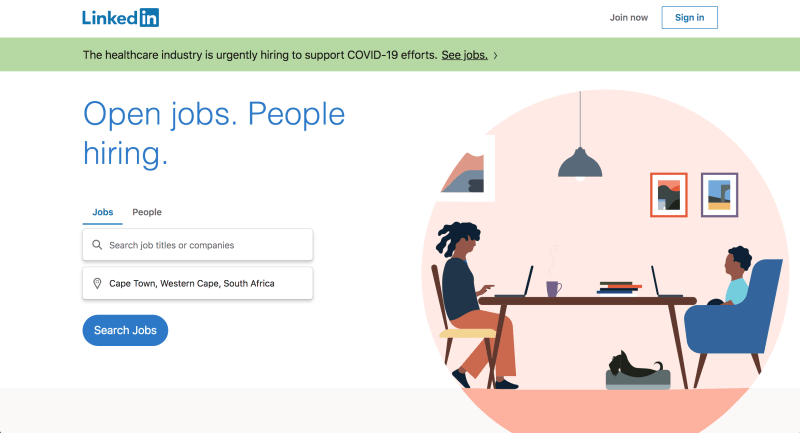You want to find remote developer jobs.
You've found them:
Full-time / Part-time Developer Jobs
💻🏡💵
Employ Remotely
Employ Remotely is a job board that specifically caters to developers. Because it’s only for developers, you won’t have to waste time looking through irrelevant jobs.
Although they’re fairly new, they already have a long list of promising remote developer jobs. Some of the companies you can find on Employ Remotely are Creative Commons, BuddyBoss, Hubstaff, and Toggl.
Jobs are neatly categorized into four categories: Front-End Developer, Back-end Developer, Full-stack Developer, and Mobile Developer. You can also filter jobs according to the language or framework.
Another cool thing about them is you can send your CV/resume and they will critique it for free through their website ratethiscv.com. Having an impressive CV will skyrocket your chances of getting hired, so I highly recommend taking advantage of this free resource.
Pros
- Jobs are easy to browse using the categories.
- You can land jobs in really amazing companies.
- There are no fee deductions. It’s completely free to use.
Cons
- They don’t have an FAQ section so you’ll have to send an email for any question you might have.
🌴
RemoteOk.io
RemoteOk is a remote job portal with different kinds of remote works. Even though there are non-tech jobs such as copywriting and hiring, the majority of job posts on RemoteOk are tech jobs.
It has a straightforward design that makes it simple to use. You can type your skill on the search bar or just click “Software Development” on the menu below.
You don’t have to (and you can’t) create a profile in RemoteOk to start sending applications. When you click the Apply button, you will be redirected to the application URL provided by the employer. This can be on the company website or some other website.
Pros
- You don’t have to create a profile before applying which saves time.
- The portal is easy to navigate.
- New jobs are posted almost daily.
Cons
- No FAQ, About Us, or Contact Us sections. The website feels impersonal without a way to get in touch with a “real person”.
🌴
Flexjobs
FlexJobs is another website that curates job posts from all over the web. Flexjobs lists all kinds of remote works.
It’s not a free service. You can pay as low as $4 if you get the yearly plan, but there’s also a monthly plan that costs $14.95.
They also have helpful articles and resources about different aspects of working remotely including looking for the right opportunity, managing your time, and also inspiring success stories.
If you can spare some cash, FlexJobs might be worth your while.
Pros
- They look for good remote opportunities all over the web.
- They have tons of testimonials or success stories from job seekers who used their services, so they might be worth the few bucks.
- Their website is easy to navigate.
Cons
- It’s a paid service, so it’s not the best place for people looking to spend as little as possible.
🌴
Hubstaff Talent
Hubstaff Talent is the remote talent portal of Hubstaff, a time tracking and productivity tool used by companies to monitor their remote employees. Hubstaff Talent is completely free to use both for employers and job seekers.
All kinds of remote works can be found here including web and software development. There are full-time and part-time jobs as well as project-based gigs. You can filter jobs according to skills, job type (full-time, hourly contract, or fixed price), date posted, pay rate, and experience level.
I personally use Hubstaff Talent for hiring other freelancers. We've worked (and continue to work) with some really talented people found from this platform.
Pros
- It’s very easy to create a profile and begin applying for jobs.
- It’s 100% free to use. No commission fees will be deducted from your salary.
Cons
- It doesn’t have as many job postings as other job portals.
🌴
LinkedIn Jobs
According to the latest statistics for 2020, around 77% of recruiters are on LinkedIn. If you don’t have a LinkedIn account yet, it’s time to create one.
Once you have a profile, you can start looking for web developer jobs by going to LinkedIn Jobs. Sometimes, recruiters may directly message you especially if you have an impressive profile.
You can make your profile stand out from the rest by taking the following steps:
• Use a professional profile photo. Read on how to take one here.
• Complete your profile. Write an attractive headline and list your achievements, past projects, and job experiences. Make sure to upload your resume and portfolio.
• Regularly update your account by sharing/resharing useful content and expressing your opinion on different matters.
Learn more tricks to stand out on LinkedIn in this blog post: 10 Ways to Make Your LinkedIn Profile Stand Out (2020 Guide).
Pros
- Many recruiters use LinkedIn to look for the best candidate.
- You can use LinkedIn groups to identify key contacts in your industry.
- You can learn a lot about companies by following them.
Cons
- You can pay a monthly fee to be a “Featured Applicant” which I am not a big fan of.
- Profile customization options are limited.
- You’ll receive payments directly from clients so you have to be extra careful of scams.
🌴
For Freelance / Project-Based Works
🏝️🖥️💰
Let me preface this section and mention that I believe the BEST way to get freelancing clients is through your own website.
If you want to know how you can get clients, watch this:
Otherwise, also consider these 2 platforms below:
Upwork
Upwork is one of the largest platforms for remote workers with over 16 million registered freelancers.
Clients can come in here to look for budget-friendly yet high-quality freelance services. Although many clients here are looking to save on costs, it just takes the right strategy to build your reputation and charge a premium. In fact, some of their highest-rated developers charge well over $60/hour.
Upwork isn’t the friendliest platform for beginners, but there are still some ways to stand out as a newbie:
• Research the top 20 profiles, study the profiles’ strengths and weaknesses and make your profile better than them.
• Make sure your proposals are hard to ignore by attaching an excellent portfolio and giving as much value as possible.
• Do a great job on each project. Clients can leave reviews on your profile so make sure they only have praises to say about you.
Pros
- Thousands of jobs are posted every day.
- You can set your price.
- They offer a safe way to receive payment.
Cons
- High commission fee deducted by Upwork.
- The competition is extremely stiff.
- You have to buy bids to send proposals.
- It’s a hassle for new profiles to get approved.
🌴
Fiverr
Some of you may be wondering why I included Fiverr here, but hear me out 😘
Fiverr may be known as the place where lowballers are looking for the cheapest services, but that doesn’t mean it’s impossible to earn a decent income here.
I actually earned thousands from Fiverr within one year.
Here’s how:
• I created a strategy to stand out from the crowd.
Because I noticed that other people offering the same service as I didn’t have good main images or videos, I made sure to have a good cover image and an animated video. Look for ways to stand out and how you can do better than the competition.
• I proceeded to secure reviews.
Because Fiverr is all about reviews, the next main thing is to secure one to two reviews.
• I created a pricing tier for more work.
A pricing tier is where you offer increasing rates for more services. In my case, I offered a $5 website conversion report, a highly detailed action plan and UI document for $100, and then a proposal of 4 figures for me to implement the plan.
• I secured a recurring client through this strategy.
I improved his website, his sales more than quadrupled, and we worked together on more projects.
You can read more about how I did it here: 8 Platforms Web Developers Can Sell Their Services On.
Pros
- You can set the price for your services.
- You can customize your profile to stand out from the competition.
- Most gigs are $5, but you can see this is an opportunity to introduce a pricing tier.
Cons
- Lots of competition.
- Fiverr takes a 20% cut from every transaction.
- You can’t contact clients outside of Fiverr, so if you want to leave Fiverr you can’t take them with you.
And those were websites where you can find web developer jobs or freelance projects.
If you learned something here and if you think a friend of yours might benefit from it, feel free to share this article!
Actually, you are obliged to share it with your friends because it took me a while to get this article together 😀
If you have any suggestions that should be on this list, please comment them below.
Thanks for reading and see you in the next blog post!














Top comments (54)
I highly disagree with your support for fiverr. This has nothing to do with whether or not you can make a living through Fiverr but it is because people who know nothing about software development and web design pricing think that this work should be easy for us and thus should be paid cheaply. We as developers have to make a stand by not caving to low ballers simply because we may just need the money. Clients need to understand that good work requires plenty of time and a decent pay. Unfortunately, many devs outside of the US charge way too cheaply for these services, thus lowering expectations of pricing.
There’s another way to look at it: view Fiverr et al as acquisition channels. Having seen the “buying” side as well, the race to the bottom not only applies to prices but also quality, unfortunately. Whenever we contract someone from these platforms, we have to go through smaller projects since few people are willing to do an interview upfront. As Kyle pointed out, one small deal can lead to much bigger gigs and happy relationships and all you need to do is let quality shine through.
Exactly, Arne :) thanks for understanding it in context
I totally agree
Thanks for your opinion, Oziel :)
How much would you charge? (I would appreciate having examples including the position, language and experience if you could give)
I haven't landed my first job yet.
Assuming you live in the US, it depends on the project. If it's a small static website (3 - 7 pages with no blog template), then the minimum I would charge is $500, especially if it's Wordpress; if you are a more experienced designer and can dish out a really good looking website, then you should be charging $800 - $1200, especially if there are a lot of unique pages (like landing pages) and if you are integrating a back end language for templating or for access to a database for storing a bit of data; high end websites could be $1400 to $2000. Then as you get in to the realm of e-commerce or large blogs, you have to start charging a minimum of $1000 but more like $1400 to $5000 depending on how big the business is (small shops would be in the lower range and large corporations would be charged that big price).
Speaking of e-commerce, we should now mention web and mobile apps. If you are doing those types of projects, it's actually better to charge hourly because those projects can last 3 to 6 months, so you want to be compensated fairly for that. Junior devs would be charged $16 - $22/ hour, mid level would be like $24 - $30, and seniors would be $32 and above. In some projects, you could do a contract of a base fee like $1200 for a web app, plus an hourly rate for anything that's outside the scope of the work (think deployment, testing, making changes to work that's already been done, etc.).
Of course these are my opinions on pricing so each developer's rates will differ. For the average stack of technologies like Python, JavaScript, PHP, the usual databases like MySQL or SQLite, you would refer to the rates I mentioned, but for more enterprise-level technologies like Java, .NET, SQL Server, you would charge a bit more. If you know rare stuff like COBOL or similar legacy tech, you could charge serious cash because there's not as many developers out there that know those skills and many government agencies and corporations still rely on that.
Thank you for the detailed explanation!
Sign up on RemoteMore, they have a remote salary calculator.
It tells you how much others with a similar background to yours charge in remote developer jobs.
Excellent list! This must have taken a good chunk of time to write :) Well done! Especially liked your point about starting small. Great advice, just make sure that you don't get stuck in that mindset :)
May we add our own resource, as well? CodersRank is a platform where you connect your public and private repos to create your profile. Based on your real work/experience, we connect you with the most relevant jobs and recruiters. codersrank.io
Have a great day!
Thank you :)
Great! Thanks for sharing CodersRank - it looks like a very helpful resource :)
Hi Kyle - FYI Remote Leads premium service is a scam. I and a few others are having to reclaim our money through our banks. You can see full details here - twitter.com/HAJBlack/status/130807...
Hmmm interesting.
Obviously there's more to the story, but it doesn't seem like twitter.com/levelsio style?
Remoteleads.io is not levelsio's site (his is remoteok.io which is awesome).
Remoteleads.io is by Derick Sozo/Ruiz - twitter.com/dericksozo
Great list Kyle. I recommend adding DailyRemote(dailyremote.com) as it is also one of the great remote job boards with daily updated jobs posted in various categories such as Software Development, Design, Support, Sales, Writing, Product, Legal, Finance, etc.
Awesome :) thanks for sharing this, Daniel :)
Probably one of the oldest job boards for remote jobs that I know of! Most of them nowadays belong to the same company btw. It's quite interesting to see, how big of a business that is..
Very informative article 👍
Just a little surprised that you didn't include indeed.com and angel.co which are among the best sites for remote jobs.
Thanks for sharing those links Mohsin :)
There are plently of others like Craigslist, etc. that I didn't include in this article, but I hope this current list was helpful 👌
What are most popular payment methods (outside PayPal) to use when freelancing?
Depends on the client. My biggest client pays by check, via snail mail (US Postal Service). Another client likes to pay via bank transfers (ACH). I've also used Stripe invoices a few times to accept credit card payments.
Recently doing with TransferWise and I am happy with it.
I also compared remote job aggregators and got a bit different results.
Also, I found a new source — Bergamot.io, probably, it might be interesting for you tool :) Thanks for the article!
dev.to/nataliefdv/10-biggest-remot...
Thank you for the great post, Kyle!
I would definitely add 🚀 RemoteMore:
👉 join.remotemore.com/devto 👈
It is a marketplace for full-time/part-time remote jobs.
With over 300 remote companies hiring through it.
Awesome list Kyle. I recommend adding OnlyRemoteJobs (onlyremotejobs.io) as it is also one of the great remote job boards with daily updated jobs posted in various categories such as Software Development, Design, Support, Sales, Writing, Product, Legal, Finance, etc. Thanks in advance! :)
I completely understand the context why you mentioned Fiverr + Upwork here, after reading some of your comments (above/below).
Things:
I also worked on a remote job, with my team with focus on manual screening of every job. You can check out here, feedback is appreciated.
Regards,
Judy Smith
Sorry But I Disagree with you on the Case of Fiverr and Upwork. Both of These Platforms are very old and many freelancers are working there as Full-Time Employees. These individuals are holding the Upwork and Fiverr for More than 7-8 Years and They Have a Monopoly in this case. They charge clients as much as they want because their rating is high and they are old.
Both of these platforms are not for beginners, Beginners will have to make a lot of effort in order to get started with the Fiverr and Upwork.
You haven't even asked how I generated 5 figures with Fiverr :)
It's all about the strategy, Abdur... there will ALWAYS be others with more experience.
You can learn more here - youtube.com/watch?v=h3sBU6Q-3c0
Read it properly though - it's AN option, not my main recommendation.
Thanks for your opinion :)
Well done putting together such a comprehensive list, with well-researched pros and cons.
I recently built a new resource for finding remote work because I was frustrated with a few things:
Remote Technology Jobs is what I built to address these issues:
standardresume.co/remote-jobs
If anyone has feedback, please let me know. We launched recently and still have a lot to learn!
Hey! Would be fun if you'd check out my site too and let me know what you think? 🙂👉
remotehub.io
Looks good :) thanks for sharing
🚀 remotemore.com/candidates
For remote developer jobs - you should definitely check out RemoteMore.
On RemoteMore, there are over 300 remote companies hiring.
The positions are fully remote and long-term (both full-time and part-time).
🚀 RemoteMore